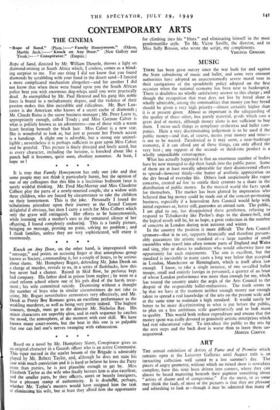MUSIC
THERE has been great outcry since the war both for and against the State subsidising of music and ballet, and some very eminent authorities have adopted an unaccustomedly severe moral tone in
their castigations of the spendthrift policy adopted on the first occasion when the national economy has been near to bankruptcy.
There is doubtless no wholly satisfactory answer to this charge ; and though the recognition that man does not live by bread alone is wholly admirable, among the commodities that money can buy bread should be given a very high priority—almost certainly higher than It is at present given. Almost as important is the safeguarding of the quality of those other, less purely material, goods which cost a great deal of money, although money alone is not sufficient to buy them. I mean such things as symphony orchestras and ballet com- panies. Here a very discriminating judgement is to be used if the public money—and that, of course, means your money and mine— is not to be wasted. Paradoxical as it may seem, a near-bankrupt economy, if it can afford any of these things, can only afford the very best ; any support of the second- or third-rate product is a wholly unjustifiable extravagance.
What has actually happened is that an enormous number of bodies have by now managed to dip their hands into the public purse. Some of them are at least morally admirable for their disinterested efforts to spread—however thinly—the butter of aesthetic appreciation on the dry bread of everyday life. Others look suspiciously like rogue concerns, created ad hoc to entitle their creators to a share in the distribution of public money. In the musical world the facts speak for themselves. The market has been glutted by impresarios who believed that big money could be made out of the concert-promoting business, especially if a benevolent Arts Council would help with initial expenses or, better still, guarantee an annual sum. The public, I am glad to say, has disappointed these gentlemen, refusing to respond to Tchaikovsky like Pavlov's dogs to the dinner-bell, and the logical result will be, let us hope, a great reduction in the number of concerts in -London during next autumn and winter.
In the country the position is more difficult The Arts Council sponsors—that is to say, supports financially and therefore presum- ably guarantees the artistic standard of—a large number of small ensembles who travel into often remote parts of England and Wales and sing, play or dance to audiences who would otherwise have no opportunity for such enjoyments. The aim is excellent, but the standard is inevitably in many cases a long way below that accepted in London, Manchester or Birmingham, which is itself often low enough I know, to take a single instance, of one so-called ballet troupe, small and entirely foreign in personnel, a quarter of an hour of whose London performance was more than enough for me, which has toured the country under the aegis of the Arts Council to the despair of the responsible ballet-enthusiasts. The truth seems to
, be that we have at the moment neither enough money nor enough talent to spread a real knowledge of the arts on the present scale and at the same time to maintain a high standard. It would surely be better to be more discriminating in what is put before the public, to plan on a less ambitious Wale quantitatively and to look more to quality. This would both reduce expenditure and ensure that the money spent was really devoted to genuinely artistic enterprises which had real educational value. To introduce the public to the arts by the area steps and the back door is worse than to leave them un-


































 Previous page
Previous page